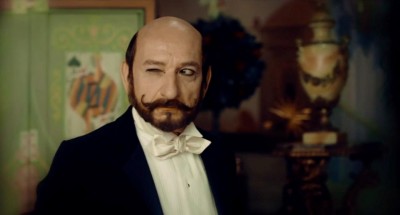
Sitting here Monday morning with one eye on The Gay Divorcee on the TV—winner of the Best Song for 1934, back when the category made sense — the first thing that struck me about the previous night’s Oscar show was that the whole thing just plain needs rethinking. It probably won’t happen. After all, this is something put on by people who think Billy Crystal with a suspiciously too black beaver pelt glued to his head and looking one face-lift away from Joan Rivers is pretty edgy stuff. Still, it needs rethinking all the same.
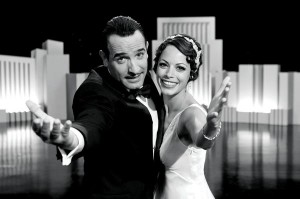
This was yet another night of few surprises and a great deal of tedium. Whether you thought it deserved it or not (and I didn’t), you pretty much knew that The Artist was going to sweep most of the big awards. The only moment of clarity in that was when the voters gave Woody Allen the Oscar for Best Original Screenplay for Midnight in Paris over it. Whatever The Artist had going for it, it wasn’t writing. Similarly, whether you’d seen any of the Best Foreign Language nominees or not, did anyone really think that A Separation wasn’t going to walk away with that Oscar? I have nothing against A Separation — though I actually prefer Bullhead and have yet to see the others — but it was such a lock for a variety of reasons that there was no tension. That — along with an absolutely funereal pace — describes the entire evening.
Really, the biggest question for me was whether or not the Academy would have Ken Russell in their memorial montage. I was greatly relieved that they did — not in the least because it saved me the trouble of gathering villagers with torches and going all the way to Los Angeles to burn the Academy to the ground. Now, could they have found a nice film clip to go with it? Yes, they could have, but, no, they didn’t.
It’s not that I didn’t have any dogs in this fight. I did. And some of them — like Allen’s screenplay — won. I was also happy with The Shore winning Best Short Film (Live Action), though I’d have been just as happy with Tuba Atlantic. I was delighted to see The Fantastic Flying Books of Mr. Morris Lessmore beat out the over-hyped Pixar entry for Best Short Film (Animated). I was happy to see Rango win for Best Animated Feature, but the competition was either so lame, or so little seen that it was yet another foregone conclusion.
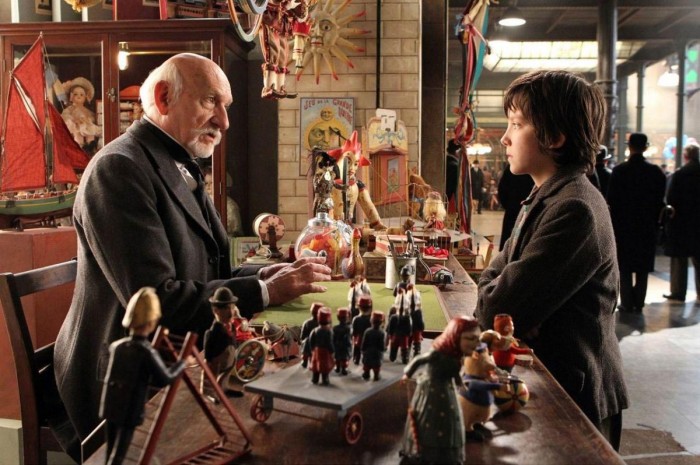
Of course, it’s no secret that I think Hugo is a full-fledged masterpiece and that it ought to have gotten Best Picture and Best Director, but I went into this knowing how incredibly unlikely it was that this would be the case. (Among other things, Scorsese got an Oscar “too recently” by Oscar logic.) I was able to do a series of “at least it wasn’t” rationalizations when the inevitable run of “big award” wins fell to The Artist. You know, “At least it wasn’t War Horse or Extremely Loud & Incredibly Close or Moneyball etc.” Still, I’d have preferred Hugo, or even Midnight in Paris, by a substantial margin — but I also believe they will far outlast The Artist with or without Oscars.
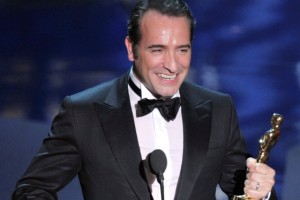
It didn’t help the case for The Artist — which I admit is a pleasant, clever, little movie — that I watched William A. Wellman’s Wings (1927) earlier in the day, something that only widened the gap between a great silent movie of the era and the attempts of The Artist. I could go on at great length about what I think is wrong with The Artist, but I think you can get the gist of it by the fact that the director cited Billy Wilder as his big influence — a man whose directorial career began well into the sound era. I do remain firm in my hope that if nothing else The Artist might get people to look at the real deal.
At least Jean Dujardin’s somewhat perplexing win for Best Actor (really? he was better than Gary Oldman?) answered the question as to why his character in the film wouldn’t make a talkie. No one would have understood him. “Dooglass Fairbonks,” indeed. Hell, the censors so didn’t understand him that he pulled a Melissa Leo and uttered That Word — and they didn’t notice. (Dujardin owned up to it later, according to reports.)
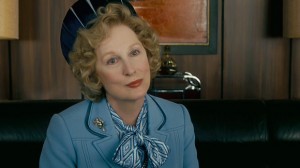
In another perplexing move, the Academy voters seem to think that it’s harder to turn Meryl Streep into Margaret Thatcher than it is to turn Ralph Fiennes into Voldemort and come up with all the other peculiar looking creatures in Harry Potter. That just seems wildly improbable to me — not that Margaret Thatcher doesn’t qualify for a peculiar looking creature, mind.
Speaking of Streep — and this is nothing against her — but did she really deserve that Oscar out of that field of nominees? Or was it just her time? I incline toward the latter. There are several extremely good moments in her Margaret Thatcher performance, but was the “the best?” I don’t think so. Actually, I’d have gone for any of the others — except Rooney Mara (what was she even doing in there?). Plus, everyone was so sure it would be Viola Davis that I get a kind of bad vibe about the choice.
To go back to the beginning of this, let’s look at this whole Best Song thing. Two nominees? And two so-so songs at that. Back in 1934 when this was added to the awards, musicals — original film musicals — were not uncommon. Now? Well, what was the last one you saw? On the rare occasions that we get a musical these days, it’s from a stage show (with maybe one, usually mediocre, added song for the ending credits) or it’s made up of songs from another source. Original screen musicals? Maybe Idelwild from 2006, but I’m not swearing that all those songs were original to the film. It is perhaps time to consider retiring the category.
Anyway, here we are with another notch in our Oscar belt. It always seems a little more like a duty than a pleasure, but this year it seemed even more so. And to borrow a question from Justin Souther, just how does a movie that runs 158 minutes get the award for Best Editing?



“Billy Crystal, hosting his ninth Oscar show (his first was in 1990, his most recent was in 2004), seemed to be overseeing a cruise ship dinner show designed to appeal to the over-50 travel club. Early on, it hit the rocks and started to list. Almost everyone drowned.”
http://www.washingtonpost.com/lifestyle/style/tv-review-oscars-wishful-thinking/2012/02/23/gIQAVCT0cR_story.html
A not unreasonable assessment.
And to borrow a question from Justin Souther, just how does a movie that runs 158 minutes get the award for Best Editing?
I think they mistook “best” for “most.”
For the six people who will get this — that picture of Sir Ben proves to me that he’s the only choice for the lead in a biopic of James Finlayson.
And how was Sir Ben not even nominated?
>>> how does a movie that runs 158 minutes get the award for Best Editing?
I dunno. I thought the 330+ minute version of “Carlos” was incredibly tight. Certainly wouldn’t have wanted anything removed. Needed a couple of bathroom breaks, too, which they considerately edited in.
I’ve wondered that from the day the nominations came out.
Perhaps they are punishing him for being in an Uwe Boll film.
Surely people with worse things on their resumes have won Oscars.
Is there a record for most thank yous received on a night you didn’t win anything? Because Scorsese might hold that now.
To be honest, the cutaways to him were probably the highlights of the ceremony for me.
You mean it wasn’t Billy Crystal? Or the “Look! Look! We’re being funny now!” antics of Will Ferrell and Zach Galifianakis?
Regarding Ben Kingsley (I’m glad he’s dropped the SIR in his movie credits) and James Finlayson you are spot on but what I want to know is who will play Laurel & Hardy and who will direct said biopic?
The real question is who is going to play the ever-popular Mae Busch.
Regarding Mae Busch, it has to be Emily Mortimer.